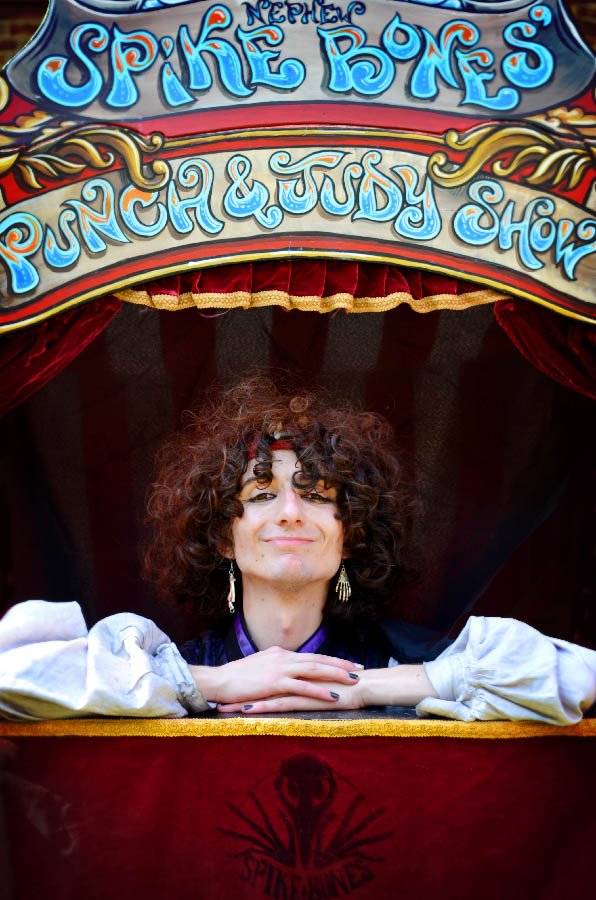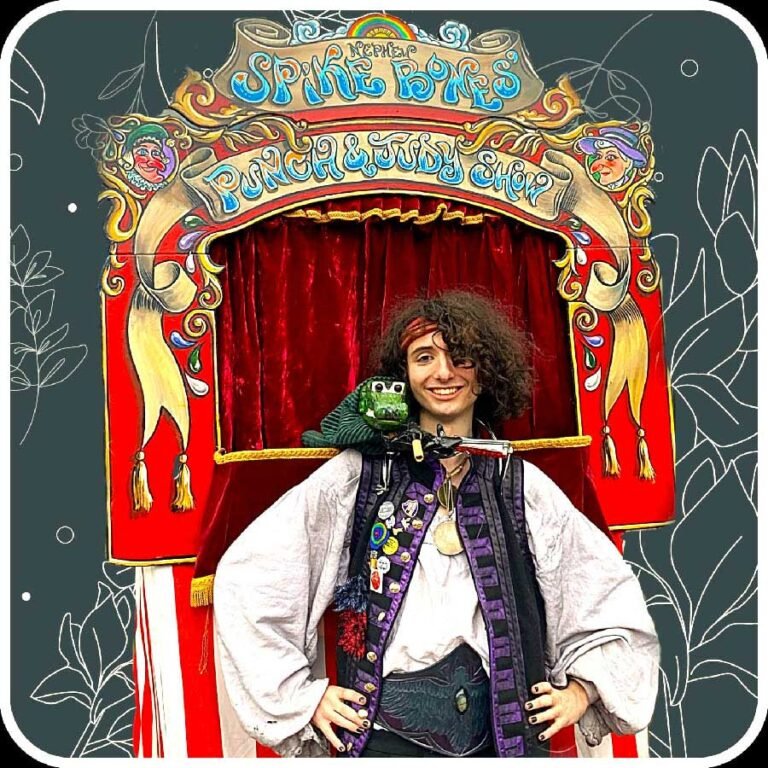Nephew Spike Bones’ Punch & Judy show is a new perspective on an old tradition: both Mr. Punch and Ms. Judy take centre-stage as they work (and sometimes shirk) their responsibilities.
Classic adversaries like the devious devil, the pompous police officer and the carnivorous crocodile all return to meddle with Punch & Judy, who, as always, delight audiences with their witty responses and slapstick takedowns.
Suitable for all ages – from 1 to 100, Spike Bones’ Punch & Judy deconstructs and reconstructs the form to make a show that is fun and inclusive for everyone!
The story of Spike Bones’ show.
This modern version of Punch and Judy was premiered at the 49th annual Covent Garden May Fayre and Puppet Festival, in London in 2024.
It was designed as a contemporary version of Punch and Judy, offering a more gender balanced representation of the controversial couple: the show puts Ms Judy centre stage and questions the nature of her 360-year marriage, will be performed for the first time at the
Spike developed the show with Dr Alissa Mello & Dr Tony Lidington from the University of Exeter, as part of ‘The Judy Project’ – a three-year investigation into the roles that women have played in this puppetry tradition over the past 300 years and how gender is portrayed through the artform. The Judy Project’s aim is to make a critical and historical investigation of women and puppetry from the Eighteenth to the Twenty-First century, funded by the European Union’s Horizon 2020 research and innovation programme under the Marie Skłodowska-Curie grant, the University of Exeter’s Public Engagement with Research fund and the Society for Theatre Research. Additional consultation was provided by Suffragette scholar – Naomi Paxton.
The show draws upon historical figures and movements such as the Suffragettes and Pride in its costumes and set colours and has subsequently toured seasides and festivals in the South West England.

Dr Alissa Mello is the Judy project’s lead and Marie Sklodowska-Curie Postdoctoral Research Fellow in Exeter’s Department of Communications, Drama and Film:
“At its core, this is a Punch & Judy show with familiar characters—Ms Judy, Mr Punch, Joey the Clown, the Police Man, the Crocodile and the Devil—but not all are fulfilling their most familiar roles. There are subtle practical, narrative and design changes and updates that may or may not have meaning for everyone, but are there if one is looking. Each adds a new and modern layer, expanding who the show is for and what meaning it conveys.”
Spike commented on the work:
“Our challenge was how to work with and update a traditional form of entertainment that comes with a lot of audience expectation about what it is, whether you view it as misogynistic and making light of domestic violence, or as romping family entertainment and a keystone of English seaside culture, it is something that tends to provoke a deep-seated response. In the end we spent a lot of time laughing, so our hope is that audiences will do so too.”
Spike developed the puppet scenes, which were then refined and iterated upon in collaboration with the team, and trialled with drama students, faculty and entertainment colleagues, as well as students at West Cliff Primary Academy, a local primary school.
The first documented performance of the Punch character was recorded by Samuel Pepys in his diary of 9th May 1662, when a marionette puppet called Pulcinella, rooted in the Commedia Dell’arte tradition of Italy, played at Covent Garden and shortly after at the Court of King Charles II. British puppeteers quickly adopted the character and employed him and sometimes his wife (at that time known as ‘Joan’), as disruptive crowd-pleasers. It was not until the late 18th century that the booth show, with which we are more familiar, began to appear. As the characters became hand puppets, so their new-found portability enabled them to migrate away from urban theatres to become staples of popular street and seaside entertainment.
Dr Lidington, Senior Lecturer in Drama at University of Exeter and an expert in British popular entertainment remarked:
“We think of Punch & Judy as this very traditional form of entertainment, but it’s actually remained very nimble throughout history. Its cast of characters have evolved to reflect audience tastes and current concerns, such as Adolf Hitler temporarily replacing the figure of the Devil and the phasing out of the Chinese jugglers and Punch’s mistress, Pretty Polly. So, in that sense, our show is keeping with tradition.”

Spike Bones in ‘The Guardian’
Judy stands up to Punch as classic puppet show gets modern makeover | Puppetry | The Guardian
‘Punch with A Twist’ – Spike Bones’ burlesque Punch & Judy show (for adults only) – the ‘Being Human Festival’, November 2024
This new version of the iconic Punch & Judy show is aimed exclusively at an adult audience and made its debut at the Being Human national festival which aims to engage academic research with accessible community events.
It followed on from the successful project undertaken by the team this year to create a more contemporary, gender-balanced version of the show, which played to audiences at seaside and tourist venues throughout Devon during the summer.
The show premiered at Bodmin on 9th November and Exeter Quayside on 10th November, 2024 and are another output of the public outreach ‘Judy Project’ – a three-year research programme which is investigating the roles that women have played in this puppetry tradition over the past 360 years and how gender is portrayed through the artform.
Dr Alissa Mello, the Marie Sklodowska-Curie Postdoctoral Research Fellow in Exeter’s Department of Communications, Drama and Film said: “Punch began life as a character who performed for largely adult audiences. As Punch & Judy moved from 18th century urban theatres and strolling players to the streets and seasides of late 19th century England, its content evolved to reflect the new audiences it was playing to. Now, thanks to this funding from Being Human, we have the opportunity to revisit what a show might look like for a contemporary adult audience.”
Dr Tony Lidington, Senior Lecturer in Drama at University of Exeter, artistic director of Prom-Prom and an expert in British popular entertainment remarked: “The public response to the work we have done so far has been universally positive – young and old, traditionalists to those with a taste for alternative cultures, the show has drawn praise for the way in which it has updated the story without losing its appeal for all ages. Puppetry often contains adult themes and resonances that are embedded within the form of family entertainment, and this new version enable Spike and the team to explore some of those darker elements.
Spike Bones added: “There is a tradition in the popular performing arts of the seamier side being exposed on occasions – indeed, pantomimes still do this. So it could be argued that this is all part of the carnivalesque misrule of popular culture, where beauty is represented by the grotesque, youth and old age are swapped and the sacred becomes profane.”
Links:
Punch & Judy Fellowship: https://www.thepjf.com/
The Judy Project: https://thejudyproject.exeter.ac.uk/
British Puppet & Model Maker’s Guild: British Puppet Guild
The Judy Project is a three-year transhistorical study of women practitioners, female gender and its representations in Punch and Judy from the 18th century to the present day. It investigates who these women are, what they have contributed, how they have shaped this iconic English tradition, and how meaning and gender, that are embedded in the performance, have evolved relative to social and cultural shifts over time. The suite of project outputs planned include publications, development of new shows, and a website (https://thejudyproject.
This research project received funding from the European Union’s Horizon 2020 research and innovation programme under the Marie Skłodowska-Curie grant agreement No 101020076 and The Society for Theatre Research. The shows received additional support from the University of Exeter’s Public Engagement with Research fund and the Being Human Festival, the UK’s national festival of the humanities, that took place 7–16 November 2024. Led by the School of Advanced Study, University of London, with generous support from Research England, in partnership with the Arts and Humanities Research Council and the British Academy. For further information please see beinghumanfestival.org. The research is being implemented at the University of Exeter in the Department of Drama.

This research project received funding from the European Union’s Horizon 2020 research and innovation programme





